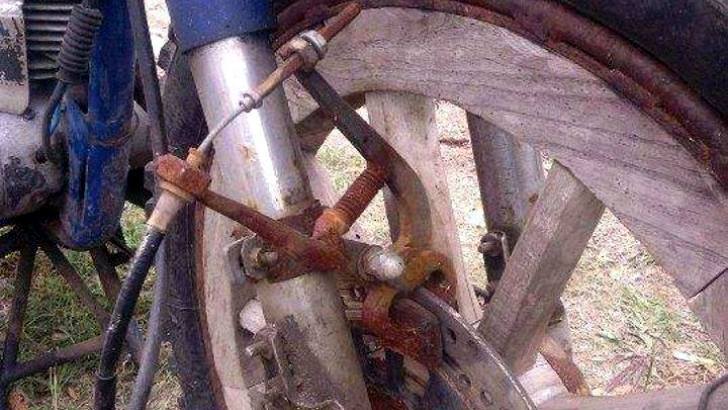It’s always funny when I stumble upon some old photos of things which are so intriguing that they seem to never lose any of the “novelty” factor… even though this sort of novelty is not always what normal people expect. So here’s a piece of stunning custom bike building we just don’t run into every day, and which introduces a completely new level of braking… technology, if this term is allowed.
Well, the improvised braking system is only one of the things which are close to insanity about thins bike. You will of course observe the rim, which makes us think about the Amish carriages. Strange technology was used to weld a curved iron rod to a metal band attached to the wooden wheel and create a bead for the knobby tire.
In the lower right corner you can observe what appears to be the tube valve. While the first thought was about how difficult balancing the wheel would be, it only lasted a fraction of a second before it gave way to aloud burst of laughter. In case you need explanations for this, then maybe you should not be riding a motorcycle at all.
As for the interesting brake caliper, we can “guesstimate” some of the “features and benefits”. First of all, you’d be so much better off not having to use it, because the brakes will feel excessively spongy. It would also feel a bit lagging, and lack precision.
Another drawback is the fact that the rotor tends to wear down pretty unevenly when using the brake, but I’d say that nobody would even think of checking the service wear limit, at least not until the disc breaks down completely.
One last thing: I really hope you’re already laughing and abandoned all thoughts of adding a serious comment in the dedicated section after the jump.
Is it the iron or the wood age?
It’s impossible to tell how well does the tire stick to the improvised bead lock, but it looks like this might work… up to a point. Frankly, the tire seems to be well inflated, judging by the roundness of its wall, but again, I doubt it would withstand anything else than carefully treading on a fairly decent riding surface.In the lower right corner you can observe what appears to be the tube valve. While the first thought was about how difficult balancing the wheel would be, it only lasted a fraction of a second before it gave way to aloud burst of laughter. In case you need explanations for this, then maybe you should not be riding a motorcycle at all.
As for the interesting brake caliper, we can “guesstimate” some of the “features and benefits”. First of all, you’d be so much better off not having to use it, because the brakes will feel excessively spongy. It would also feel a bit lagging, and lack precision.
A braking system not affected by rain
On the good side, this system is impervious to rain. No more carbon vs steel MotoGP dilemmas: the nail cutter brakes deliver the same (inexistent) performance in the dry and in the wet, and even in snow. Technically, no type of inclement weather could reduce the performance of this system.Another drawback is the fact that the rotor tends to wear down pretty unevenly when using the brake, but I’d say that nobody would even think of checking the service wear limit, at least not until the disc breaks down completely.
One last thing: I really hope you’re already laughing and abandoned all thoughts of adding a serious comment in the dedicated section after the jump.
